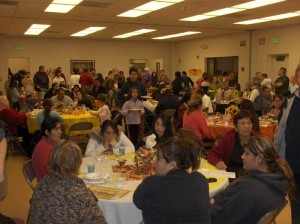Sushi, tamales, pho and, of course, turkey with all the fixings.
For many immigrants in the Bay Area, Thanksgiving is a melting pot of foods and traditions. For some, it’s an occasion for helping less fortunate members of their communities. For others, it’s a day that holds little significance.
Here is a snapshot of how local immigrants are planning to spend this most American of holidays:

Migrant celebration
Mario Banuelos, director of the Morgan Hill Community Foundation, plans to celebrate with 200 others.
An agricultural community between San Jose and Gilroy, Morgan Hill is home to one of California’s largest concentrations of seasonal workers, the majority from Mexico. About 13 years ago, a group of residents, including the Mexico-born Banuelos, came together to help these men and women — first by providing coffee and donuts, later by distributing clothing and offering job training.
A Thanksgiving eve turkey dinner at St. Catherine’s Church is an annual highlight, Banuelos said. “This will be our 11th Charity Dinner. It is geared towards low-income and migrant families,” he said, adding that more than 200 people attended last year and a similar turnout is expected on Wednesday night.
Saving for hard times
Tuan Nguyen, a Vietnamese immigrant, was a lawyer in his native country and a reporter for Calitoday, a San Jose-based publication that runs articles in both English and Vietnamese. Nguyen has built up a strong network of friends and associates, and he plans to host a large group at his family’s home.
It won’t be an extravagant Thanksgiving meal, he said, more like a potluck. Nguyen said he is saving money to assist Vietnamese friends who are facing financial hardship.
“This is a tough time because the economy is not very good,” he said. “Instead of spending much, I can give donations to my Vietnamese church and help my friends. Maybe one day when I face financial hardship, they will help me.”
New family traditions
Zelica Rodriguez, an immigrant from El Salvador, returned from her honeymoon in the Dominican Republic a few weeks ago. Her new husband is a San Francisco native.
In the past, when she spent Thanksgiving with only her side of the family, she incorporated rice, beans and panes con pavo, a Salvadorian turkey sandwich. This year, she will spend the evening with her in-laws and debut her traditional American cooking skills. With roasted turkey, cranberry sauce and mashed potatoes on the menu, Rodriguez said she is excited to sit together with her extended family and share what they are thankful for.
‘A regular day’
Christina Pham is a first-generation immigrant from Vietnam who recently graduated from UC Davis with a degree in Asian American studies. Pham said her family does not celebrate Thanksgiving at all.
“It is like a regular day for us,” she said.
Over the years, Pham has been invited to several Thanksgiving dinners with other Vietnamese families who observe the holiday. She said, “It really depends on how Americanized a family is. The more Americanized, the more likely Thanksgiving will be celebrated.”
Mix-and-match
Zachary Konda, a fifth-generation Japanese American, is a student at Horace Mann Elementary School in San Jose. He said he is excited to show off his ukulele skills to his cousins, Jeremy and Grant, when he visits his uncle’s house for Thanksgiving.
Zachary will be served a fusion of American and Japanese dishes, including turkey and sushi. “We, as parents, teach our children about our own culture and what our parents taught us as well,” his mother, Thia Konda, said.
What is Zachary most excited about? Dessert. His favorite is the pumpkin ice cream from Trader Joe’s.
Through a child’s eyes
Vishalakshi Vallurnatt calls herself “a raw immigrant,” having moved to California from India just three years ago with her husband.
She works as the outreach coordinator at MAITRI, an agency that helps South Asian families affected by domestic violence. Vallurnatt said she treats Thanksgiving as ” a vacation (more) than anything else.” She said, “We do all our meals together as a family. Why would you celebrate one meal together?”
However, she said she plans to embrace the traditions more as her 4-month-old daughter grows up. “Everything changes when we have a baby. We need to start assimilating a little more,” Vallurnatt said. “My daughter just had her Halloween costume. She will get her Christmas tree and gifts under the tree next month.”
Straddling cultures
Patricia Diaz is a first-generation immigrant whose parents migrated from Mexico in the 1960s. She said she was raised with Thanksgiving dinners of yams, rolls, turkey and mashed potatoes. She plans to pass this tradition down to her children.
Diaz said she believes that immigrants need to assimilate into U.S. culture. However, she also wants her two kids to remember their roots. Diaz, who lives in San Jose, is thankful that her children will have grandparents to relate to and interact with during the holiday.
“I want my children to understand how Thanksgiving is celebrated in the United States but also know the language we speak and learn that this is who we are and to be proud of it,” she said.

Very good! Re assimilation: Here’s my top-ten list of what we should expect from those who want to become Americans (and those who are already Americans, for that matter). The list was first published in a National Review Online column a decade ago [link: http://old.nationalreview.com/comment/comment091200d.shtml ], and it is fleshed out in Congressional testimony [link: http://judiciary.house.gov/hearings/May2007/Clegg070523.pdf ]:
1. Don’t disparage anyone else’s race or ethnicity.
2. Respect women.
3. Learn to speak English.
4. Be polite.
5. Don’t break the law.
6. Don’t have children out of wedlock.
7. Don’t demand anything because of your race or ethnicity.
8. Don’t view working and studying hard as “acting white.”
9. Don’t hold historical grudges.
10. Be proud of being an American.